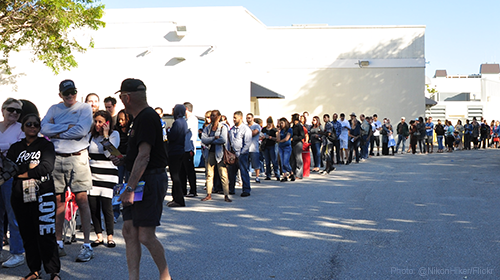
What if the government forced all clothing stores to sell only extra-small T-shirts? And what if this happened because some politicians concluded consumers should be treated "uniformly" when it came to shopping options and decided that consumers should be forced to wear the same size T-shirt, no matter whether they can actually fit?
Ohio officials have recently applied this same absurd logic to the right to vote by cutting early voting in the interest of "uniformity." This week the ACLU and the ACLU of Ohio challenged those cuts in court.
Some more background: Ohio has decided to force all 88 counties to cut their early voting hours down to the lowest common denominator. Specifically, Ohio completely eliminated the first week of early voting – which was also the only time when Ohioans could register and vote at the same time – and eliminated all evening hours, all Sundays, and the Monday before Election Day.
Forcing everyone to wear an XS T-shirt isn't treating everyone "uniformly" – it singles out and punishes those who can't fit in it. And in the 2012 election, data from the state and its counties show that 157,000 Ohioans voted on the days that have now been cut in the interest of "uniformity." A disproportionately high percentage of those are low-income voters, many of whom are also African American.
Lower-income voters tend to rely on evening and Sunday voting because they cannot take paid time off of work to vote during regular business hours. Single parents need these hours because it's the only time they can find friends or family who can provide childcare. People experiencing homelessness or severe transience rely on the opportunity to register and vote at the same time during the first week of early voting.
And among the African-American church community, Sunday voting has become a cultural institution, when African Americans across multiple generations can gather together after church to collectively participate in a fundamental civil right that their ancestors paid for with their blood.
Real voting equality means giving everyone an equal chance to vote, no matter how much money they make. If Ohio were truly interested in "uniformity," they should allow same-day registration, Sunday voting, and evening voting in all counties. But they cannot make it harder to vote in the name of uniformity. In this case, one size does not fit all.
For more information about the case, go to NAACP v. Husted.
Learn more about voting rights and other civil liberty issues: Sign up for breaking news alerts, follow us on Twitter, and like us on Facebook.


